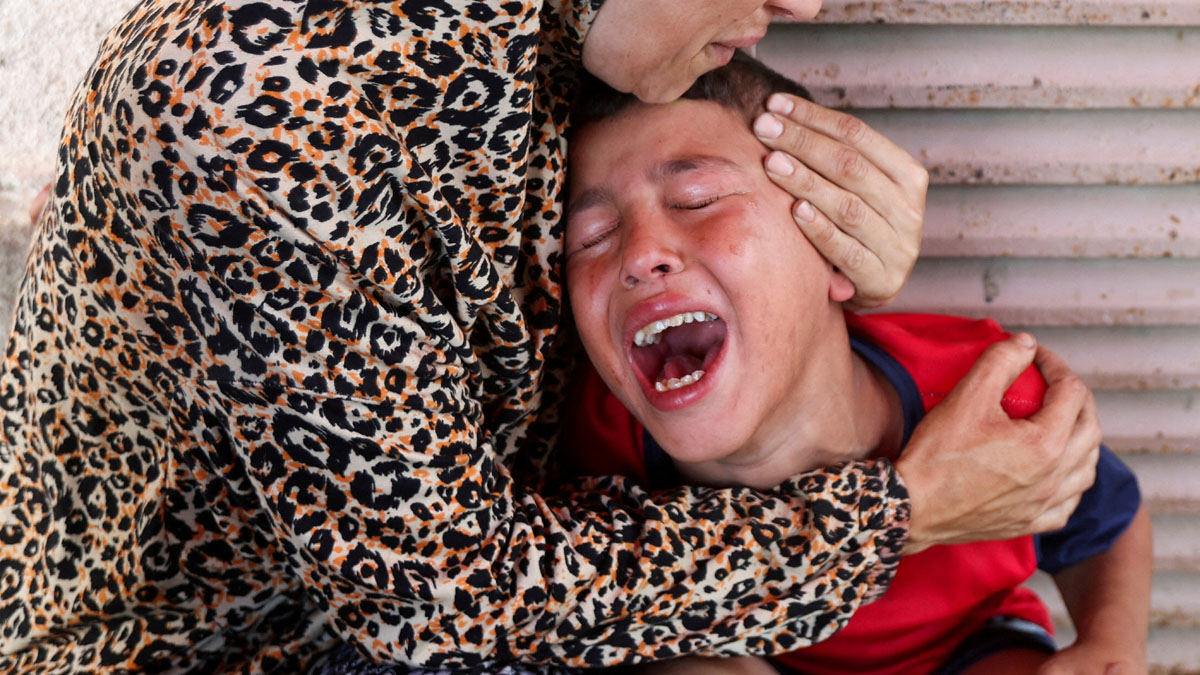After IDF strike kills 10 children, Israel and European Union reach deal to allow more aid to Gaza
 Palestinian mother Samah Al-Nouri, whose daughter Sama was killed in an Israeli strike on Thursday near a medical center in Deir Al-Balah, comforts her son, as casualties from the strike are brought into Al-Aqsa Martyrs Hospital, in Deir al-Balah, central Gaza Strip, July 10, 2025. REUTERS/Ramadan Abed TPX IMAGES OF THE DAY
Palestinian mother Samah Al-Nouri, whose daughter Sama was killed in an Israeli strike on Thursday near a medical center in Deir Al-Balah, comforts her son, as casualties from the strike are brought into Al-Aqsa Martyrs Hospital, in Deir al-Balah, central Gaza Strip, July 10, 2025. REUTERS/Ramadan Abed TPX IMAGES OF THE DAY
European officials have reached a new agreement with Israel to facilitate the delivery of urgently needed food, fuel and other aid into Gaza, according to the European Union’s foreign policy chief Kaja Kallas. Speaking to Bloomberg Television in Kuala Lumpur on Thursday, Kallas announced that the deal outlines clear terms regarding the volume of aid, the number of crossings to be opened and the mechanisms for distribution, including water supply points.
“This agreement includes very concrete measures—how many trucks will get in, which crossings will be opened, and where distribution points will be set up,” Kallas said. She added that fuel deliveries and infrastructure repair are also part of the deal, and that safeguards will be put in place to prevent Hamas from diverting aid. The EU has been examining punitive action against Israel, accusing it of violating the terms of a cooperation deal regarding Gaza.
Anouar El Anouni, spokesman for the European Commission, provided further details in Brussels, confirming that Israel had approved significant steps via cabinet decisions and in coordination with the EU. These include opening additional crossing points in northern and southern Gaza, reopening routes from Egypt and Jordan, and expanding food distribution through bakeries and public kitchens. He noted that protecting aid workers remains a priority.
The announcement came hours after an Israeli airstrike that killed 15 people, including 10 children, waiting for assistance outside a medical clinic in Deir al Balah. Footage from security cameras showed civilians gathered peacefully before a blast scattered their bodies. UNICEF’s executive director Catherine Russell condemned the attack, calling it “unconscionable,” and highlighted the desperation of families seeking help after months of deprivation.
Israel’s military said the strike was aimed at a militant target near the clinic. A senior Israeli official later confirmed that the aid agreement had resulted from continued discussions with the EU, not from pressure, and corroborated Kallas’s account of expanded access for humanitarian operations.
Israeli Foreign Minister Gideon Saar, speaking from Vienna, acknowledged the deal and described it as an outcome of Israel’s engagement with the EU. He said it would enable more aid trucks, open more crossings, and increase delivery routes. Kallas stressed that she expects Israel to fully implement all agreed measures.
However, it remains unclear whether the aid will be delivered through the existing UN-managed system or an alternative Israeli- and US-supported mechanism, the Gaza Humanitarian Foundation. The latter has been criticised by aid agencies for falling short of meeting Gaza’s basic needs. The UN reported that Israel had allowed 75,000 litres of fuel into Gaza—the first delivery in 130 days—but warned it was far from enough to meet even one day’s requirements.
Prime Minister Benjamin Netanyahu, departing Washington after meetings with US President Donald Trump, indicated that a 60-day ceasefire deal, supported by the White House, was still under negotiation. He said Israel would consider a permanent end to hostilities only if Hamas agreed to disarm and relinquish control of Gaza. US officials, including Secretary of State Marco Rubio, expressed cautious optimism, saying talks mediated by Egypt and Qatar had made significant progress.
Middle East